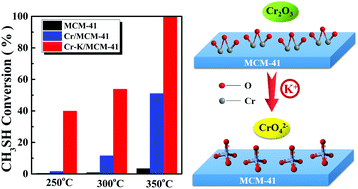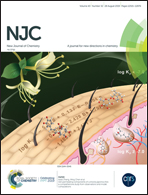Probing the nature of active chromium species and promotional effects of potassium in Cr/MCM-41 catalysts for methyl mercaptan abatement†
Abstract
Cr/MCM-41 catalysts were synthesized and characterized to get a better understanding of the active chromium species, and the effects of the alkali metal potassium (K) on methyl mercaptan (CH3SH) abatement were investigated. The samples were characterized using several characterization techniques (XRD, TG, UV-vis, XPS, CO2-TPD, O2-TPD, Raman and H2-TPR) to determine their physicochemical properties. Cr(VI) species with excellent reducibility could be considered as the active species, while Cr(III) species could be assumed to be the inactive species. Remarkably, the introduction of K enhanced the catalytic activity of the Cr/MCM-41 catalysts and completely converted CH3SH at 350 °C, which is a significantly lower temperature than that reported in the literature. Moreover, the analysis of the chemical states and structures of the samples proved that the strong interaction between K and Cr generated K2CrO4 and K2Cr2O7 species, which anchored plenty of active monochromate species to increase the catalytic activity. Moreover, the introduction of K results in a supply of more low coordinated oxygen species to enhance the basicity of the Cr-based catalysts.



 Please wait while we load your content...
Please wait while we load your content...